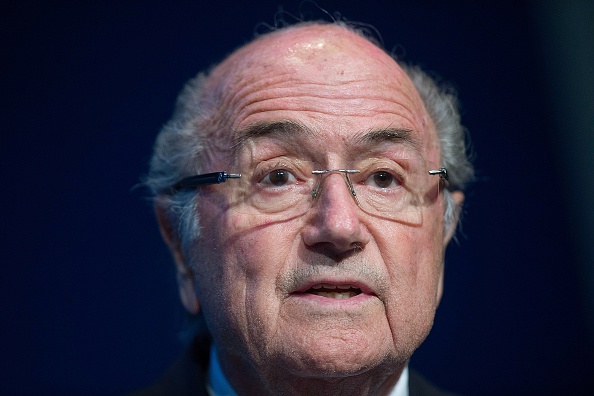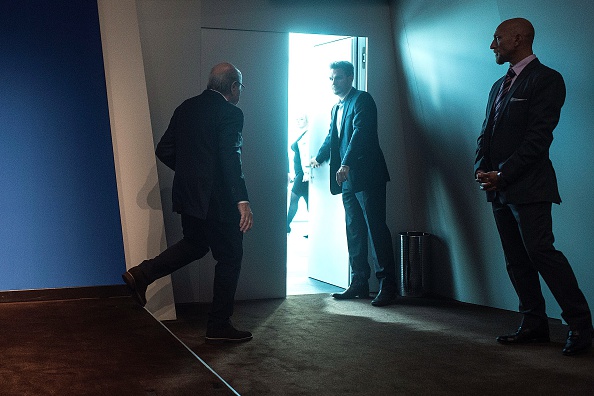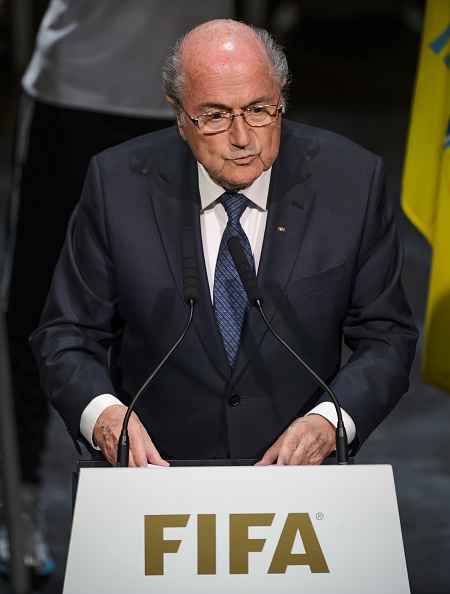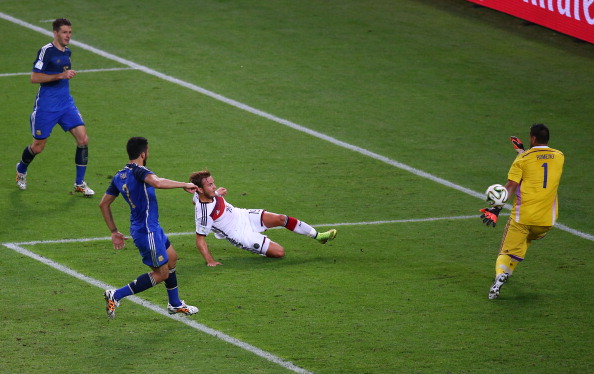Attention, soccer crazies: the United States is not, repeat not, a soccer nation.
Or, as your all-knowing mother — and, for sure, mine — might have said: here today, Ghana tomorrow.

Every four years, with the arrival of soccer’s World Cup, the opportunity presents itself to write a column like this. It’s difficult to know which is more fun. The column. Or the howling in response from the soccer crazies.
Though I have lived in California for 31 years, I was born and raised in Dayton, Ohio. If I went back home to the central bus stop in Dayton, on Main between Third and Fourth, and asked the first 10 people I met who Landon Donovan is, odds are they would say, no idea. Maybe that guy from “Little House on the Prairie”?
At the outset, to be clear: I actually like, really like, soccer.
One of the perks of my job is that I have gotten to see games at some of the great temples of European soccer — San Siro, Allianz, Old Trafford, Emirates, Bernabéu, Camp Nou. Moreover, I was there at the David Beckham news conference in Carson, California, in 2007. And I would venture that Giovani Dos Santos’ goal, the dagger that gave Mexico its fourth goal in its 4-2 victory over the United States in the 2011 CONCACAF Gold Cup at the Rose Bowl, is still one of the great displays of soccer skill, anytime, anywhere.
Of course, that most of the 93,420 people in the stands that day were rooting for Mexico — and that the American team had been up 2-0 and a real team at that level does not, can not blow a two-goal lead — emphatically prove my point.
But I digress.
I do not, will not, dispute that over the next month thousands of Americans will crowd bars and sit in front of their living-room TVs to watch the goings-on from Brazil. That is not, however, because the United States is a soccer nation or even because the U.S. team has an odds-on chance of getting out of the Group of Death. It is because Americans love big events. The day the World Cup is over, soccer in the United States will go back to being what it is — background noise.
I might wish it were different. But it’s not.
The Los Angeles Times, where I spent 17 years as a staff writer, ran a story a few days ago that explained to readers “how to watch the World Cup.”
For purposes of discussion, it is essentially 40 years, or two generations, since Pelé joined the New York Cosmos — it was June, 1975. That’s more than enough time for Americans to have learned how to watch the World Cup, if they were so inclined.
Did the LA Times feel compelled to run a similar story before the Super Bowl — explaining, for instance, who the Denver Broncos or Seattle Seahawks were, and how a first down involves moving a football 10 yards or more on the ground or through the air? Obviously not. There’s no need to do so. Football is ingrained in American culture. Soccer is not.
Throughout this column, by the way, I am going to be resolutely American and call it soccer. Not futbol or football, all pretentious-like, like this story in the New York Times that is a candidate for most over-the-top piece of journalism in recent memory. I have covered Rose Bowls, BCS championship games and Super Bowls. That is football. Later in this column I am going to return to football, and explain why football, Peyton Manning-style, is what Americans really care about. So soccer it is.
Here, soccer nuts, is the crux of the problem: there are heavy economic, social, cultural and peer incentives working against soccer.
Before getting there, let us examine some of the arguments that the United States is, actually, a soccer nation:
Look at how many teams there are now in the MLS! Look at the new MLS TV deal! Look — the English Premier League is now on NBC!
For sure there are more teams now than before in the MLS. It’s even expanding. (Oh, joy. More minor-league soccer.)
Currently, there are 19 MLS teams. (Up to 21 soon.) According to a November, 2013, story in Forbes, 10 are making a profit. Maybe I didn’t learn a lot in journalism school but if 10 are making money it seems pretty elemental that nine are not or are at best breaking even.
If the financial play in the MLS is increased franchise valuation over time, fine. Good for the owners and their long-term investment plans.
But to have the half the teams in the league flat or in the red — as Dean Wormer might have said in Animal House, that is no way to go through life.
Since this is a World Cup year, you’d think that attendance at MLS games would be way up, right? Wrong. Eleven of the 19 teams are down. Overall, through June 2, attendance is down 1.86 percent from 2013.
As for TV:
The new package, an eight-year deal with ESPN, Fox and Univision, is worth a worth a reported $90 million a year or, all in, $720 million.
Compare that to these numbers:
ESPN is paying $5.6 billion for Major League Baseball, $7.3 billion for a 12-year deal for the new college football playoff system, $15.2 billion for “Monday Night Football.”
CBS Sports and Turner Sports are paying $10.8 billion for 14 years, 2011 through 2024, to show the NCAA men’s college basketball tournament.
When you compare the soccer package with sports that matter in the United States, the conclusion is inescapable: soccer is, at best, a value proposition.
And why is that? Because ratings for the MLS stink. Again, from Forbes: ESPN’s regular-season telecasts were down 29 percent, to an average of 220,000 per game, while NBC’s MLS audience fell 8 percent, to 112,000 per game — ranking the MLS behind the WNBA.
So, the natural question: why are ESPN, Fox and Univision shelling out money? And why is NBC showing the Premier League?
Disclaimer: I have had a relationship with NBC, on air and online, since 2003. But I have had no involvement, zero, with its soccer programming.
The logical answer is that in an age of exploding channels, soccer games fill a lot of airtime. And there’s a niche that’s interested, especially in the Premier League.
But that hardly makes the United States a soccer nation. Especially if what’s at issue is televising games from some other country.
It’s so obvious that football is America’s game. The two most popular sports in the United States are the NFL and college football.
When Ohio State and Michigan play football, they jam into the Shoe in Columbus or the Big House in Ann Arbor.
The two schools played at Michigan in 2013, at Ohio State in 2012. Here are the attendance figures: 2013 in Ann Arbor, 113, 511. 2012 in Columbus, 105, 899.
When the two schools play men’s soccer? Michigan played at Ohio State last Oct. 6. Attendance: 962, at 10,000-seat Jesse Owens Memorial Stadium.
As they say, ladies and gentlemen, numbers do not lie. The numbers here say that soccer is roughly 1/100 as popular as football. That seems about right.
Oh, and there’s an MLS team in Columbus. So it’s not as if soccer is unknown in central Ohio. (Incidentally, for 2014, through June 2, Columbus Crew attendance is down 7.95 percent compared to 2013.)
The issues confronting soccer, as it relates to football, are both simple and complex.
When boys who are talented athletes are roughly middle-school age, they self-select out of the AYSO leagues they have all been in since they were 5 or 6. Why? Because it becomes apparent that there is way more opportunity — of all sorts — in football than soccer.
For one, there are more than 120 FBS football schools. Each of those schools offers 85 scholarships. This is simple math -- more than 10,000 scholarships. There's also the allure of playing on television every week.
There simply aren’t that many soccer scholarships -- a fully financed Division I team can offer 9.9 full scholarships for freshman to seniors, and those scholarships can be divvied up among the team. In total there are 1,990 scholarships.
That’s a powerful economic incentive right there in favor of football -- roughly a 10 to 1 scholarship-available ratio at the major-college level alone.
Then there are the many social and cultural imperatives.
At many if not most high schools, it is a tradition that the football players get to wear their jerseys to school on Fridays. It is a big deal on multiple levels to be school royalty — believe it.
It has been a long time since I was in high school but this much has not changed: cheerleaders and the dance team tend to notice the football players.
Do you think “Friday Night Lights” was all about … soccer? Right.
If you are good enough to play college football, that is a calling-card that stays with you for life -- in business, wherever you go. That is America.
This is not likely to change.
Talk, too, all you want about concussions, and how a great fear of football is suddenly going to sweep the country and drive parents to move their boys to soccer. As if. Talk to soccer moms about concussions — you don’t think you can get hit playing high-level soccer?
We haven’t even gotten yet to basketball. Suffice to say that there are basketball scholarships, too, and that basketball, college and the NBA, is way more popular than soccer. That’s why CBS and Turner are shelling out those billions for March Madness. It’s why — if I went to that bus stop in Dayton — you bet they’d know who LeBron is, and I wouldn’t have to volunteer a last name.
There are all kinds of things wrong with baseball. Yet each year most Major League teams consistently draw millions of fans.
The United States is not really a hockey nation, either. But on this subject it’s difficult. The Los Angeles Kings just won the Stanley Cup for the second time in three years. The Cup went back to the bar across the street from the house I lived in for 14 years. So I’m going to move along in this column.
The two factors that can spark the changes that might — I say, might — make the United States a soccer nation are, one, a deep run in the World Cup, or, two, the MLS.
A deep 2014 World Cup run would be, in a word, unexpected. It would seem apparent that US Soccer head coach Jurgen Klinsmann, who dumped Donovan and is going with a younger team, is setting things up for a more sustained run in 2018 in Russia and hoping luck might turn the Americans’ way in Brazil. No argument here with that strategy.
Of course it all starts Monday with Ghana — which has knocked the U.S. out of the past two World Cups, beating the Americans in the final group-stage game in 2006, defeating the Americans again in the round of 16 in 2010.
Meanwhile, the MLS simply is not designed for that kind of far-reaching change. Structurally, everything is all wrong. US Soccer is in charge of soccer in the United States, not the MLS. Which is kind of weird — like USA Basketball telling the NBA how to run things. Which, when you think about it, raises a fundamental question: why is it that way in American soccer?
While that gets sorted out, one of the best thing that could happen to the MLS — besides the obvious, more talented players — would be a sharp dose of the WAGs and drama that attend the Premier League. That would make soccer way more interesting.
In the meantime, everyone, enjoy the World Cup. Don’t sleep on the Belgians.
When it’s all over in Brazil, NFL training camps will commence. Thankfully. Richard Sherman, America awaits your next breath of fresh air.











